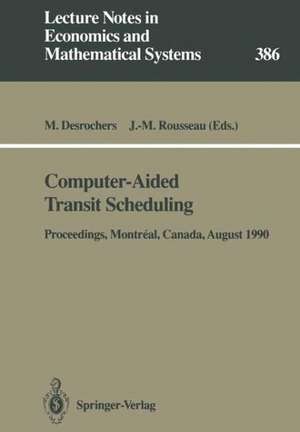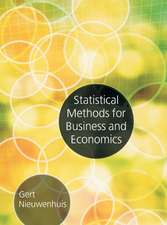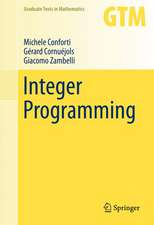Computer-Aided Transit Scheduling: Proceedings of the Fifth International Workshop on Computer-Aided Scheduling of Public Transport held in Montréal, Canada, August 19–23, 1990: Lecture Notes in Economics and Mathematical Systems, cartea 386
Editat de Martin Desrochers, Jean-Marc Rousseauen Limba Engleză Paperback – 5 aug 1992
Din seria Lecture Notes in Economics and Mathematical Systems
-
 Preț: 360.02 lei
Preț: 360.02 lei -
 Preț: 383.93 lei
Preț: 383.93 lei - 15%
 Preț: 693.39 lei
Preț: 693.39 lei -
 Preț: 384.09 lei
Preț: 384.09 lei -
 Preț: 380.07 lei
Preț: 380.07 lei -
 Preț: 446.26 lei
Preț: 446.26 lei -
 Preț: 497.37 lei
Preț: 497.37 lei -
 Preț: 380.84 lei
Preț: 380.84 lei -
 Preț: 384.86 lei
Preț: 384.86 lei -
 Preț: 378.34 lei
Preț: 378.34 lei -
 Preț: 399.67 lei
Preț: 399.67 lei - 20%
 Preț: 360.93 lei
Preț: 360.93 lei - 15%
 Preț: 643.16 lei
Preț: 643.16 lei -
 Preț: 379.09 lei
Preț: 379.09 lei -
 Preț: 404.76 lei
Preț: 404.76 lei -
 Preț: 385.62 lei
Preț: 385.62 lei - 15%
 Preț: 644.49 lei
Preț: 644.49 lei -
 Preț: 379.09 lei
Preț: 379.09 lei -
 Preț: 345.50 lei
Preț: 345.50 lei -
 Preț: 425.80 lei
Preț: 425.80 lei -
 Preț: 378.34 lei
Preț: 378.34 lei - 18%
 Preț: 775.65 lei
Preț: 775.65 lei -
 Preț: 392.60 lei
Preț: 392.60 lei -
 Preț: 401.61 lei
Preț: 401.61 lei - 15%
 Preț: 646.43 lei
Preț: 646.43 lei -
 Preț: 382.18 lei
Preț: 382.18 lei -
 Preț: 378.34 lei
Preț: 378.34 lei - 15%
 Preț: 637.59 lei
Preț: 637.59 lei - 15%
 Preț: 647.27 lei
Preț: 647.27 lei -
 Preț: 377.73 lei
Preț: 377.73 lei -
 Preț: 447.84 lei
Preț: 447.84 lei - 15%
 Preț: 644.49 lei
Preț: 644.49 lei -
 Preț: 386.00 lei
Preț: 386.00 lei - 15%
 Preț: 654.43 lei
Preț: 654.43 lei -
 Preț: 415.02 lei
Preț: 415.02 lei -
 Preț: 411.54 lei
Preț: 411.54 lei -
 Preț: 398.92 lei
Preț: 398.92 lei -
 Preț: 398.92 lei
Preț: 398.92 lei -
 Preț: 392.75 lei
Preț: 392.75 lei - 15%
 Preț: 635.47 lei
Preț: 635.47 lei - 20%
 Preț: 653.56 lei
Preț: 653.56 lei -
 Preț: 379.86 lei
Preț: 379.86 lei -
 Preț: 495.46 lei
Preț: 495.46 lei -
 Preț: 447.99 lei
Preț: 447.99 lei -
 Preț: 378.71 lei
Preț: 378.71 lei - 15%
 Preț: 637.13 lei
Preț: 637.13 lei -
 Preț: 385.84 lei
Preț: 385.84 lei -
 Preț: 378.54 lei
Preț: 378.54 lei - 15%
 Preț: 666.55 lei
Preț: 666.55 lei
Preț: 651.02 lei
Preț vechi: 765.90 lei
-15% Nou
Puncte Express: 977
Preț estimativ în valută:
124.58€ • 133.21$ • 103.87£
124.58€ • 133.21$ • 103.87£
Carte tipărită la comandă
Livrare economică 17 aprilie-01 mai
Preluare comenzi: 021 569.72.76
Specificații
ISBN-13: 9783540556343
ISBN-10: 3540556346
Pagini: 452
Ilustrații: XIV, 432 p. 49 illus.
Dimensiuni: 170 x 244 x 24 mm
Greutate: 0.71 kg
Ediția:Softcover reprint of the original 1st ed. 1992
Editura: Springer Berlin, Heidelberg
Colecția Springer
Seria Lecture Notes in Economics and Mathematical Systems
Locul publicării:Berlin, Heidelberg, Germany
ISBN-10: 3540556346
Pagini: 452
Ilustrații: XIV, 432 p. 49 illus.
Dimensiuni: 170 x 244 x 24 mm
Greutate: 0.71 kg
Ediția:Softcover reprint of the original 1st ed. 1992
Editura: Springer Berlin, Heidelberg
Colecția Springer
Seria Lecture Notes in Economics and Mathematical Systems
Locul publicării:Berlin, Heidelberg, Germany
Public țintă
ResearchCuprins
I: Status updates on scheduling packages.- Developments and recent experience with the BUSMAN and BUSMAN II systems.- The HASTUS system: New algorithms and modules for the 90s.- II: Problems and experiences from transit.- Århus public transport’s innovative rostering technique.- Developing transit scheduling tools using an “object-oriented” programming language.- Experience of using the same computerised scheduling system under three different operating conditions.- Work rule flexibility: Method to reduce PTO requirements.- Development of performance indicators using vehicle and crew scheduling data bases.- III: Bus scheduling.- Time and space scheduling of public transport networks and the evaluation of quality of service.- Scheduling considerations in designing transit routes at the network level.- Network design formulations in schedule synchronization.- SYNCRO: A computer-assisted tool for the synchronization of transfers in public transit networks.- Multiple depot vehicle scheduling problem: A new heuristic based on quasi-assignment algorithms.- An approach to vehicle scheduling with depot capacity constraints.- Optimization in bus scheduling — driver constraints deadheading estimation and size advantage.- Real-time scheduling on a transit bus route.- IV: Technology and data collection for scheduling and planning.- Improving computer-aided scheduling by cashless payment system FAHRSMART.- The use of automatic passenger counting data to verify schedule adherence.- Automatic passenger counting data: Better schedules improve on-time performance.- Flexible operation command & control system (FOCCS) with vehicle-autonomous schedule control and synchronisation.- V: Data bases for planning and scheduling.- Towards a European standard for scheduling.- Commondatabase for different scheduling tools.- The integration of computer-aided systems for planning and operational control in public transit.- VI: Crew scheduling.- EXPRESS: Set partitioning for bus crew scheduling in Christchurch.- Driver scheduling using intelligent estimation techniques with heuristic searches.- CREW-OPT: Subproblem modeling in a column generation approach to urban crew scheduling.- A new decomposition scheme of the urban public transport scheduling problem.- Appendix 1.- Appendix 2.










